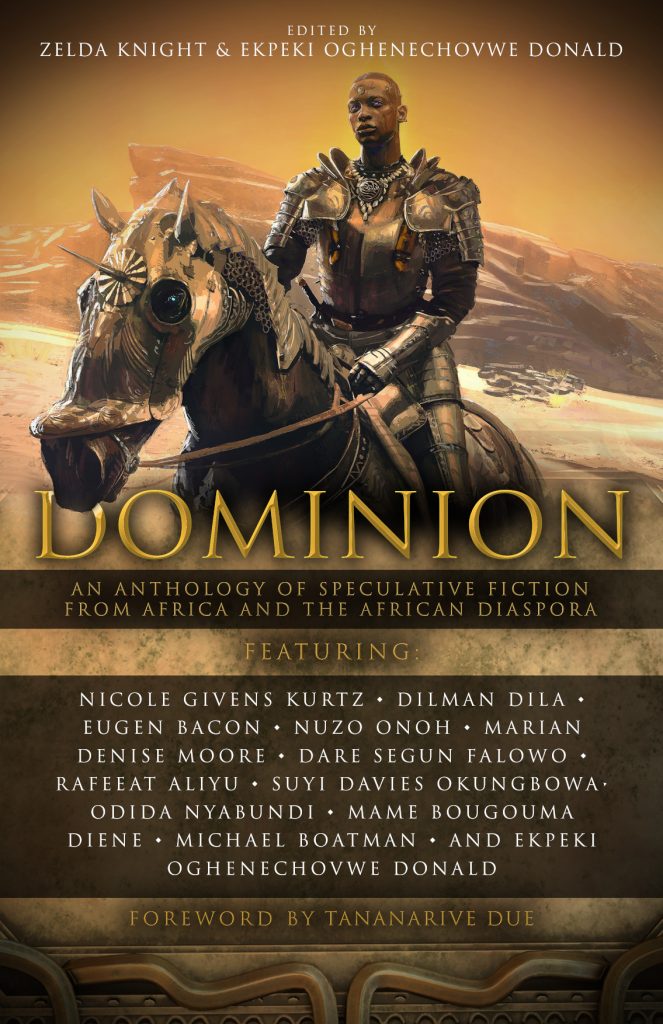Edited by Zelda Knight and Ekpeki Oghenechovwe Donald

Editors Zelda Knight and Ekpeki Oghenechovwe Donald are bringing speculative fiction by writers from Africa and the African diaspora to a wider audience. For readers who are interested in the broad spectrum of speculative fiction, this anthology offers science fiction, fantasy, science fantasy, horror, and myth — sometimes within the same story.
This convergence of genres and subgenres is one of the anthology’s strengths. Stories which cross genre boundaries force readers to question the often impenetrable boundaries between science and myth or imagination, to enquire as to whether so-called objective truths could be approached from a different perspective. This was my experience as a Western non-Black reader; I can’t say I understood all of the references, but I enjoyed the way many of these stories — in their uses of language and, particularly, story structure — vigorously demanded a flexibility of mind. Speculative fiction readers can certainly benefit from more such exercises.
The Pressures of Ecological Destruction
While few of the stories in this anthology contain a focused environmental message, many stories use ecological destruction as a setting or plot device. For example, in “Trickin'” by Nicole Givens Kurtz, old gods return to a people inundated with water to assess if they still remember and adhere to the old ways; “The Satellite Charmer” by Mame Bougouma Diene uses Chinese neo-colonization through resource extraction as a frame for an ambiguous superhero story in which the hero, in his increasing power and alienation, turns away from Earth. Ekpeki Oghenechovwe Donald’s “Ife-Iyoku, The Tale of Imadeyunuagbon” is a story which takes place after a devastating war between the United States and the Middle East, the result of which is the destruction of most of Africa. In this story, the inhabitants of Ife-Iyoku have acquired powers and skills which have helped them to survive a devastated environment.
In each of these stories, ecological destruction is a pressure placed upon the people. In many cases, pressure is relieved by ritual or the adherence to or recovery of traditional knowledge or practices or structures. This is not to say that traditionalism is an easy answer to conflict in this anthology; the aforementioned writers each, in their own ways, acknowledge the difficulties presented by the often paradoxical presence of tradition and modernity in the lives of people living in colonized spaces. The way forward is often picked out as a rocky, winding road between old ways and new. Elements of the fantastic often help characters navigate this road.
Eco-Cultural Knowledge
Another strength of the anthology from an environmental perspective is the presentation of fantastic but specific eco-cultural knowledge. For example, “Convergence in Chorus Architecture” by Dare Segun Falowo is both broadly mythological and specific about how humans interact with the nonhuman world. When Akanbi and Gbemisola are struck by lightning and members of their community must follow them into the dream into which the strike propelled them, the dream ceremony is described in terms of specific herbal-mineral concoctions they must imbibe in specific amounts, their bodies are decorated in ceremony to compel them to dream for a specific length of time. The details of the worldbuilding are intricate, expressing the depth to which characters are integrated into their environments. The ease with which Falowo’s story slips from fantasy worldbuilding to the broader movements of myth is an example of one of the elements I enjoyed most about this anthology. The mythical voice in many stories draws the reader into an expanse of cultural experience which, in turn, adds depth of character.
Dominion: An Important Collection
As speculative fiction is increasingly defined as a literature that moves outside the borders of the Western world, a collection of African and African diasporic speculative fiction is an important addition to a growing body of work. Further, while speculative fiction readers who are African or of African descent can enjoy these stories that may feel both culturally familiar and fantastic, others can and should take up this collection to be both entertained and challenged to see the world — and dreams of the world — from another perspective.
Pre-order the anthology here.

1 thought on “Review: Dominion: An Anthology of Speculative Fiction from Africa and the African Diaspora (Volume One)”